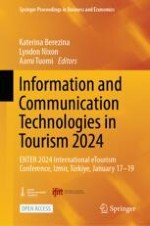For more than 30 years, Information and Communication Technology (ICT) has been revolutionizing travel, tourism, and hospitality, and as we look to the next 30 years, the change of pace does not seem to be diminishing. This open-access book provides an extensive overview of the latest developments of ICTs in the tourism and hospitality industry. Featuring papers presented at the International Federation for IT and Travel & Tourism’s (IFITT) 31st annual ENTER International eTourism Conference (ENTER24) held in Izmir, Türkiye, this book presents research on topics such as artificial general intelligence (AGI) in tourism and hospitality; emerging technologies in tourism education; virtual reality; technologies for sustainability, health and wellbeing; big data and analytics, among others.
This is an open access book.
